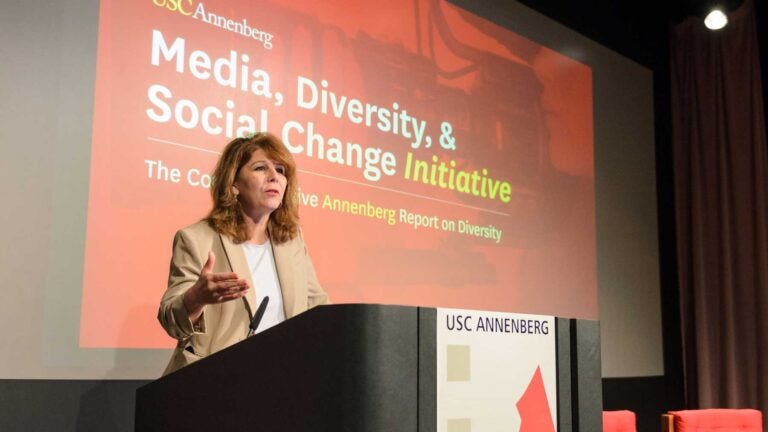
Stacy L. Smith is the director of the Media, Diversity, & Social Change Initiative at the USC Annenberg School for Communication and Journalism. (USC Photo/Benjamin Dunn)
Tech on the big screen: Computer users, and hackers, are more likely to be male characters
New study examines depictions of computer science in TV and films
Movies and television may give us the impression that technology can do anything, but who is shown using tech on screen? A report released Friday indicates there are still limits on who can be shown on screen putting computer science to work.
The study, conducted by Professor Stacy L. Smith and the Media, Diversity, & Social Change Initiative at the USC Annenberg School for Communication and Journalism and funded by Google’s Computer Science in Media team, examined portrayals of computer science across television content and movies.
It examined how many characters use computer science, the demographic attributes of those characters and the nature of those depictions — and found that characters using computer science tended to be white and male across all media studied.
Although technology powers much of our daily lives, we see few stories that reflect this in media.
Stacy L. Smith
“Storytelling opens a window into professions or activities that might not otherwise capture our imaginations,” Smith said. “Although technology powers much of our daily lives, we see few stories that reflect this in media.”
The study looked at 10 TV series and TV movies that had tapped into Google’s CS in Media team as an adviser on computer science-related storylines. It also examined characters using computer science across the top 20 movies of 2015, 20 TV series popular with 18-49-year-olds from 2015-16 and 20 popular TV series among 2- to 12-year-olds from the same time frame.
Nearly 25 percent of the characters engaged in computer science in the Google-influenced series were female, while none of the characters using computer science in the matched sample of content were girls or women. Almost 41 percent of leading or series regular characters that engaged with computer science in the Google-influenced shows were female.
Females fared better as computer science users in TV shows popular among adults 18-49 than in top films, though once again there were few characters overall using computer science. Over one-third of characters using computer science in prime-time series were female, compared to only 15 percent of characters engaged in computer science in popular movies. Forty percent of leading and/or series regular characters using computer science were girls and/or women.
“While a higher percentage of females overall used computer science in popular content,” Smith said, “girls and women are still outnumbered as computer science users, even when the only limits to their participation are the imagination of content creators.”
Hacker characters
The authors also explored factors related to computer science stereotypes. Across the stories evaluated, characters using computer science tended to be dressed in “hacker-type” clothing, lacked romantic or family relationships, and rarely mentioned how computer science could be used to help others.
“Media representations of computer science may be one way that viewers learn about the profession and develop an interest in what technology can do,” Smith said. “When stereotypes permeate the environment, theory and research suggest that this may dampen attraction to the field, especially for females. The very tool that might contribute to expanded diversity in the CS workforce may be working against it.”
The report is the latest in a series of investigations published by the MDSC Initiative this year. It is the first study conducted by the MDSC Initiative in partnership with the Google CS in Media team to assess depictions of computer science in film and TV and to use theoretical and empirical evidence surrounding stereotypes of computer science when evaluating these portrayals. To read previous reports by the MDSC Initiative, visit the MDSC website. For other reports on computer science in education from Google, visit g.co/cseduresearch.
LEARN MORE: Read extended coverage of the report on the USC Annenberg website.
